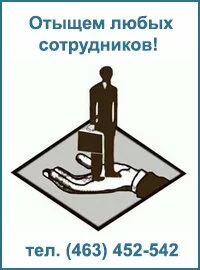Новости
|
С праздником! Поздравляем всех наших клиентов с наступающими праздниками и желаем всего самого наилучшего. Пусть те, кто никак не мог найти себе призвание, наконец найдет его, а тем, кого не устраивает зарплата, поднимут ее в несколько раз, чтобы вы смогли наконец отправиться в отпуск на один из популярных зарубежных курортов. читать... |
|
Дизайн сайта Дорогие друзья! Как вы уже могли заметить, дизайн нашего сайта претерпел серьезные изменения. Теперь сайт стал еще более удобным для всех, кто пребывает в активном поиске работы. В ближайшее время вас ожидает еще несколько сюрпризов, суть которых мы пока не станем вам раскрывать, чтобы не испортить сюрприз. читать... |
|
Вакансии нашего
агентства Наше кадровое агентство объявляет о наборе новых сотрудников в наш дружный трудовой коллектив. Даже если вы не обладаете опытом работы в других кадровых агентствах, мы готовы рассмотреть ваше резюме. Если вы нам понравитесь, мы приложим все усилия к тому, чтобы вы стали настоящим специалистом по поиску работы для наших клиентов. читать... |
|
Новые тренинги Приглашаем всех клиентов нашего кадрового агентства посетить специальные тренинги, которые мы начнем проводить с первого числа следующего месяца. На этих тренингах вы получите массу полезной информации, которая поможет вам с легкостью находить себе подходящую работу даже в самых сложных условиях. читать... |
|
Курсы для жертв
увольнения Уважаемые посетители! Мы знаем, как тяжело многие из вас переживают потерю работы, и как подчас сильно это сказывается на эффективности нового источника заработка. Предлагаем вам посетить наши специализированные курсы, которые направлены на то, чтобы помочь пережить увольнение и преодолеть связанные с ним психологические трудности. читать... |
Кадровое агентство
Добро пожаловать на сайт нашего кадрового агентства! Мы не ищем рабочие места - мы их находим! Если вы устали сидеть на пособии по безработице, значит пришло время обратиться к нам, и уже в самом скором времени вы окажетесь на своем новом рабочем месте, которое принесет вам не только финансовое, но и моральное удовлетворение.
Наше кадровое агентство существует на протяжении восьми лет. Под чутким руководством нашего директора мы с успехом ведем ежедневный изнурительный бой за новых клиентов, которые всякий раз бросаются в наши радушные объятья, лишь только узнают о нашем кадровом агентстве немного больше, чем им рассказывают наши конкуренты. И в этом нет ничего удивительного, ведь только наше агентство предлагает наиболее обширный перечень услуг, а значит, мы в состоянии помочь всем без исключения людям, которые обратятся к нам за поддержкой.
Внимательное отношение к клиентам - вот что выгодно отличает нас от большинства прочих кадровых агентств. Мы не просто говорим, что уделим вашей проблеме самое исчерпывающее внимание, мы на самом деле поступаем именно так. Вот почему за эти восемь лет, что существует наше агентство, мы получили несчетное множество положительных отзывов от тех, кто благодаря нам нашел работу.

 Ваша корзина
пуста
Ваша корзина
пуста


